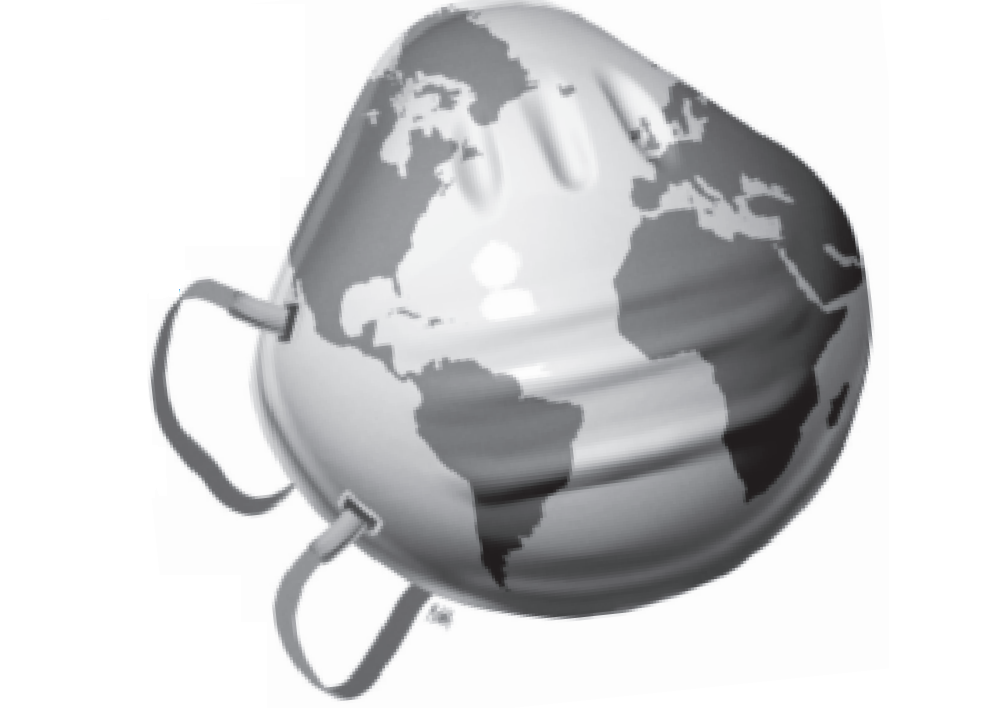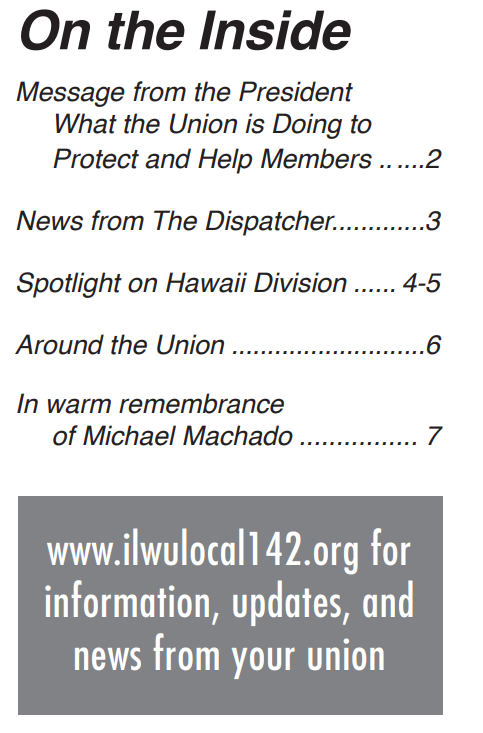Best Practices for ILWU members
How can ILWU members deal with the pressing health, work, and financial concerns caused by the COVID-19 pandemic? First, get accurate information from reliable sources. Then follow the practices recommended by public health officials to keep yourself, family members, your workplace, and community as safe as possible. Most importantly, stay in contact with the ILWU. Your union is working hard in your best interests and helping to protect your community

The World Health Organization (WHO), the U.S. Centers for Disease Control and Prevention (CDC), and Hawaii’s State Department of Health (DOH) have recommended best practices that we can follow to help slow the spread of COVID-19. If everyone works to delay infection, our local medical system will be able to handle the healthcare needs of our communities.
Taking care at home and outside of work
• Avoid crowds and close contact with people. Close contact is defined as a distance of fewer than six feet for more than ten minutes.
• Practice good hygiene. Wash your hands often for at least 20 seconds using soap and water. Always wash before eating or providing care for someone who needs assistance. Wash after interacting with someone who is sick, or if you have coughed, sneezed, and blown your nose. Wash your hands after using the bathroom or having contact with animals or pets.
If you don’t have access to soap and water, use a hand sanitizer that is at Living and working safely during the COVID-19 epidemic Best Practices for ILWU members least 60% alcohol. If your hands are visibly dirty, always wash with soap and water—the sanitizer may not effectively clean your hands. Avoid touching your eyes, nose, and mouth with unwashed hands.
Cover coughs and sneezes. Cough or sneeze into a tissue and dispose of it immediately, or cough into the inside of your elbow.
• Stay at home if you start to feel ill. Contact your doctor by phone if you have common COVID-19 symptoms: fever, dry cough, difficulty breathing. Stay in contact with your doctor and follow his or her instructions carefully.
The risk of severe illness is higher for adults 65 years of age or older. Anyone with an underlying health condition like chronic lung problems, serious heart conditions, severe obesity, or uncontrolled diabetes is also at higher risk of becoming severely ill. Those at risk should stay at home when possible to isolate themselves.
If you develop emergency warning signs for COVID-19, such as trouble breathing, persistent pain or pressure in the chest, or bluish lips or face, seek medical attention immediately. If you are taking care of someone, be aware that “new confusion or inability to arouse” is also an emergency warning sign. Call before going to the doctor or emergency room and tell whoever you speak to about the symptoms involved.
• Disinfect frequently touched surfaces with household cleaning spray or wipes. The CDC recommends daily cleaning; the DOH states that cleaning should be “routine.” Disinfecting can also be done using a diluted bleach solution using unexpired bleach or an alcohol solution that is at least 70 percent alcohol. Visit https://www.cdc.gov/ coronavirus/2019-ncov/prevent-gettingsick/prevention.html for instructions on making a bleach solution.
• The WHO also states that the following behaviors are either not effective or can be harmful: smoking, wearing multiple masks, and taking antibiotics.
“My workplace closed—what do I do next?”
You have a unique safety net as an ILWU member. The ILWU will always be here to help you, on and off the job. Whether your workplace has closed, or you cannot go to work because you are sick, or you are an essential worker who is on the front lines during the pandemic, your welfare is the ILWU’s first priority
Know that ILWU representatives are negotiating with employers to make sure that you have as much protection as possible during this health and economic crisis. If you have any questions about additional benefits that have been negotiated on your behalf due to the coronavirus, contact your Business Agent (BA) directly. All BA phone contacts have been posted online to make sure you can reach your representative if you need help.
You can also call the Division office nearest you. The offices in Hilo, Wailuku, Lihue, and Honolulu will remain open for ILWU members. Front doors are closed to the public, so please call your Division to make an appointment if you need to come down to the union hall for a face-to-face meeting.
Get unemployment benefits
• If your workplace has closed, file for unemployment insurance benefits immediately. The best way to do this is to visit the Hawai State Department of Labor Industrial Relations (DLIR) website: https://huiclaims.hawaii.gov/#/.
Have the following information ready: a savings or checking account into which funds can be deposited, your account number, and your bank routing number. Prepare to provide contact information and dates of employment for all employers over the past 18 months.
The DLIR has waived the standard one-week waiting period to receive benefits. That means that you will receive unemployment benefits starting from the date you file. However, because of the significant number of workers applying for unemployment, it may take around three weeks before you receive your first payment.
If you do not have a computer, smart phone, internet access, or need help navigating the application form, contact
—continued on page 2


